- Home
- Neal Asher
The Departure Page 15
The Departure Read online
Page 15
“Getting some weird visuals,” he slurred.
Hannah did something at that point and the three views shut down, whereupon the operating theatre returned to its normal dimensions.
“You were still open to the Internet,” she explained. “It seems Janus restored your link even when it severed its own.”
“Janus?” Bronstein enquired.
Did they really need the doctor? Saul felt sure Hannah could complete the operation by herself now that she had the necessary equipment. Perhaps it would be safer if he just raised the automatic and put a bullet through the side of Bronstein’s head.
“Not your concern,” Hannah replied.
“I’m just curious, obviously.”
“Put it this way,” she said, “you already know enough now to get yourself permanently adjusted through a recycling plant. Do you really want to know more?”
“Well, things can’t get much worse than you describe. Yes, I do want to know.”
After a pause in which yellowish three-dimensional space sectioned by cubic gridlines began to expand inside Saul’s skull, where surely there could not be room for it, she replied, “If you think things can’t get any worse than that, you obviously don’t know enough.”
“Hey, the Inspectorate catches up with me and I’m in for adjustment anyway—or more likely a bullet through the back of the head. Yeah, I know they can stick you under an inducer until your mind’s turned to jelly, but that’ll never happen to me.”
“Why not?” Hannah asked.
“A lot of us have them now: a Hyex implant at the base of the skull.” He paused thoughtfully. “I can kill myself simply with a thought.”
“A lot of you?” Hannah echoed.
The space inside Saul’s skull had meanwhile grown vast. In fact it seemed infinite now; something underlying his mind and his perception of…everything, but still he managed to interject, before Bronstein answered, “He’s a revolutionary…Hannah.” By then he had the automatic raised and pointing straight at Bronstein’s face. The doctor seemed strangely unsurprised by this. “Over there.” Saul gestured with the weapon towards the far side of the theatre and, after a shrug, the doctor moved to where instructed, leant back against a work surface, and folded his arms.
“How much longer?” Saul asked Hannah.
“Just a minute or so and I’ll be able to glue this bit of skull back in,” she replied.
He had just wanted the time frame, not the physical detail.
“What are you two?” Bronstein asked.
“None of your business,” Saul replied, calculating the best move to make next. As his capacity for thought expanded, it seemed to be sapping his capacity to act. Other considerations impinged, like, if he shot the doctor now, this place would be filled with a mist of blood that might be infected with something, or he might damage computer hardware linked to the microsurgery.
“Only Committee executives get given the kind of stuff in your head, and they certainly don’t come here to have it fitted,” Bronstein said.
The doctor had to have some emergency way of dealing with Hannah and himself, Saul realized. Allowing them to walk in here armed had just been to reassure them, but Bronstein would never otherwise put himself at such a disadvantage, since armed customers might decide to retrieve any payment they had made. Saul needed to work out his options before Hannah finished up, because it would be then that the doctor made his move.
“It’s still none of your business,” Saul replied.
“Maybe we can help each other,” Bronstein suggested, one finger going up to his own temple.
He clearly had hardware in his own skull, and was doing something with it. After a moment he exclaimed, “Jesus!” and suddenly looked very frightened. “We have to go!” He pushed himself away from the worktop.
Saul heard sizzling and smelt burnt meat as Hannah sealed blood vessels.
“Stay the fuck where you are!”
Next a smell he recognized as bone glue.
“The Inspectorate!”
Just then something slammed against the trailer van, throwing it sideways until it crashed to a halt. Bronstein’s feet slid out from under him, but he saved himself from falling by grabbing the work surface behind him. The microsurgery tore loose from the framework steadying Saul’s head, falling to the floor with a sound like a dropped cutlery drawer, and Hannah ended up sprawled across his lap. A great booming roar filled the multi-storey and Saul heard loose objects smashing against the side of the vehicle. Almost simultaneous with this, the paralytic, which Bronstein’s clean lock must have administered to her as they entered the surgery, had now activated and dropped Hannah straight to the floor the moment she pulled herself off Saul’s lap. At the same moment, Saul found himself incapable of pulling the trigger. His arm dropped, heavy as lead. Consciousness faded.
***
As consciousness slowly returned, Saul felt totally disconnected from his body, his mind cowering alone like a cockroach in some huge tiled bathroom. But then the cockroach began to break apart, each piece of it assigned to a separate tile, as the chaotic structure of thoughts normally organized on an evolutionary organic basis found itself being stored much more logically, and given room. The table of elements sat there perfectly clear in his memory, and he found he could view those elements in any order he chose: whether by valency, atomic weight or even chromatic spectra. Spreading out from this mutable table reached a forest of chemical formulae, all just as mutable, whereupon he found disconnected parts of himself idly modelling and filling in the gaps in his knowledge. From all this he could link to subatomic formulae, but by then was positioned on another tile within his mental space, in another cube of the grid…No, such images were too much of a simplification for the benefit of his animal consciousness, for his mental space was multidimensional, the blocks of information reordering and linking up dependent on requirements. He understood this all to be real, as he woke up; his only problem was that he himself did not feel real. If he had believed in the human soul, he would have now felt certain that his own had taken a sabbatical. It seemed that those parts of his brain dealing with self-image and ego had somehow been swamped.
“More advanced than the shit in my head, then,” said a voice.
He opened his eyes to find he lay sideways in a ratty armchair, surrounded by a haze of cigarette smoke. His head, which felt as if it’d been kicked by a horse, rested on a stained pillow. Focusing his gaze, he saw two armed guards standing by the door. With great care he turned his head to take in the rest of the room.
“Slightly more advanced, yes,” Hannah replied, “but still lacking the comlife component.” She raised a cup from the table she sat beside, took a sip, then put it down again.
“Why?” asked the man, scratching at a crusty, sewn-up split in his skull as he paced round behind her, coming to a halt beside the same table.
“I’ve yet to be able to either obtain or build anything useful, and anyway it’s too early for installation,” she lied to him. Saul could sense her fear, no matter how hard she tried to conceal it. The man standing over her had, after all, been one of her experimental subjects, with hardware implanted in his skull to test it, and doubtless through which he could be interrogated. It hadn’t mattered to the government if this procedure killed him; he had been due to die anyway.
“Malden,” Saul observed, recognizing the man he had released from IHQ London.
He wore the fatigues of an Inspectorate enforcer, over a heavy-boned physique winnowed of spare flesh. Now sprouting bristles on the scalp and chin, his skull-like head had regained some humanity, but dark circles still underscored his eyes, and stitched-up slices were mapped across his crown and behind his ears. When he snapped a glance towards Saul with bloodshot eyes, it felt almost like a blow. Malden assessed him, making calculations based on this new input of him being awake and cognizant, then dismissed him as he returned his attention to Hannah. After a moment he picked up a hand-rolled cigarette from the ashtray on the
table and took a drag.
“How did he manage to penetrate Inspectorate security?” Malden asked.
Saul abruptly felt the imminence of a bullet through his brain. He had used Janus to penetrate Inspectorate security, an AI hiding on Govnet which he could summon at any moment, in turn alerting the Inspectorate to his location, and he would be dead if Malden found that out. Saul sat up, feeling sick and slightly dizzy, and with a thought called up a menu to some inner visual field.
“I used a virus,” he said. “I could give you the schematics, but I doubt it will work again now the Inspectorate is aware of it.” He paused, in his mental space somehow summoning up a virtual screen and beginning to lay down the coding for just such a virus, in case Malden requested it. Even as he did so it felt as if he had started up some sort of pump in his head, his pulse thundering inside it and a pain growing between his eyes. “Then, again, the Inspectorate has a bit of a problem at the moment, so might be slow to respond.” Saul gazed at the man intently. “How is it we are here now and what was that blast?”
Malden gave him a humourless smile. “My people were watching out for the good Dr Neumann here, so consider my surprise when she walked straight into one of our surgical units.” He paused. “The blast was a tactical nuke, and Inspectorate headquarters London is now a radioactive crater.”
In Bronstein’s mobile surgery they had been quite some distance from the HQ, yet were still at the periphery of the blast. That meant more than just the HQ was gone. As Saul absorbed the implications of this information, the part of his mind trying to build a virus just hung, nothing happening. The pain then peaked and the virtual screen dissolved in a jagged mass of migraine lights. He’d just discovered his limitations.
“How?” he asked.
Again that glance: still Malden was comparing the danger Saul represented to how useful he might be, and deciding whether or not to kill him. Saul tried to run a search through his extended mind, and again that pump started up and the pain increased. Nothing happened for a moment, then something seemed to connect inside his head, with an almost physical clunk, and he was in. It was like no search he had ever run before, more like trying hard to remember something. Menus appeared, overlaid and linked, no longer two-dimensional but spreading out in a multidimensional array, and in that instant he remembered how to turn on the beacon that would summon both Janus and the Inspectorate to him.
“It was a simple matter,” Malden spat. “Inspectorate headquarters had a weapons cache which included tactical atomics. While the staff were hiding from the readerguns, I entered that cache and left them a parting gift. So the moment they offlined their system to shut down the guns, a timer started running.”
Such understatement. To be able to open the cache and then access the computer of an atomic, he must have penetrated Inspectorate security on a level similar to that of Janus. Saul wondered if any of the staff had got in his way, and knew that any who had would have died, quickly and quietly. In the sheer ruthlessness stakes, Malden was some way ahead of Saul.
“And what are your plans now?” he asked.
Malden just blinked, then turned back to face Hannah. “Can you copy the comlife I’m running, and load it to him?”
“I could,” she nodded. “but the interface in his head isn’t ready. It’ll take time for it to establish all its connections.” Now she gazed at Saul with some sort of warning in her expression.
“How long?” Malden asked.
“A few days.”
Malden turned back to Saul. “I plan to tear their world government apart. What I need to know is what your plans are. Are you prepared to join me?”
“Yes,” Saul replied, realizing that “no” was not a healthy option.
Malden stood up. “We need to move. You’ll stay with Bronstein until you’re ready. I’ve meanwhile got to move other assets into place and notify the Council that it begins now.”
“What begins now?” asked Hannah.
“The revolution,” Malden replied succinctly. “Merrick and Davidson here will accompany you and, if you need anything, Bronstein can contact me in an instant.” He stared at Hannah for a moment longer, and she seemed to be trying to shrink in her chair. “I’m still undecided about you, Doctor, so don’t disappoint me.” He departed, saying to the guards, “Take them to Bronstein.”
As the door closed, Saul gazed at Hannah. He wanted to know more before acting, but they needed some time to talk. He bitterly reflected upon the similarity between the Committee and “the Council,” and wondered just how extensive this revolution might become. No matter if it was big enough to take down the government, he understood enough history to know that revolutions never ever led directly to a less autocratic regime.
“Come on,” said one of the guards.
Saul tried to stand up, and nearly crashed out of the chair. Hannah came over to steady him, and he managed to struggle to his feet. He still wore the disposeralls from Bronstein’s mobile surgery, and his feet were bare. As, with one guard ahead and one behind, they entered a short corridor outside, he considered what it would be safe to ask her.
“What do you know about this revolution?” he enquired.
“Malden was a prime catch for the Inspectorate,” she said, averting her eyes. “That’s why they wanted the hardware put inside his skull—so they could get at all the information it contained.” She glanced at him briefly. “I was present during his first interrogation, when they learnt enough to know that the Council is worldwide and keeps in contact via unbroken code on the Subnet. They were just learning that the revolutionaries possess arms caches and have agents high up in government, when the interrogation had to be stopped before Malden died.”
At the end of a corridor stinking of piss and scrawled with graffiti, they descended a stairway where dirty windows overlooked the sprawl. Above this a distant black cloud trailed across the horizon, strobing with the emergency lights of numerous aeros buzzing about it like flies round a turd. At the base of this he spotted the glare of orange-red fires.
He gestured towards the grim scene. “How much damage?”
“I don’t know.”
“Inspectorate HQ and about four square kilometres of surrounding ’burbs,” interrupted the guard ahead of them.
“A lot of innocent people,” Saul suggested.
The guard glanced over his shoulder. “Lot of IHQ staff and other Committee shits who lived in those ’burbs. Might even have been some delegates there, too.” He shrugged. “Anyway, the General had to grab his chance.”
“You’re Merrick?” Saul asked, whilst easily making some complex calculations in his head.
“Yup.”
“So the General just killed about four million people.”
“Total war,” said Davidson, from behind. “Better a quick death than starvation.”
Saul controlled his urge to enter a vitriolic debate about this, since he was now supposed to be a new recruit to their cause. He felt in two minds about it all anyway, since billions were going to die over the next few years. Whoever ended up in charge would not be able to change that. Maybe a massive loss of life in order to displace a totalitarian government was a cheap price to pay, when those lives were due to end anyway—that is, if the revolutionaries were likely to be less totalitarian. It just seemed morally wrong, though he then suppressed a self-mocking laugh. Who was he to be sitting in moral judgement over anyone?
Raggedy people, silenced by hunger and lack of hope, just sat numbly on the stairs and in the corridors branching off from each landing. This tenement was ZA, and he started wondering if it lay within a zero-asset sector, until they stepped out into a street thronged with both ZA and SA citizens. A mixed area, then, and clearly one the government had yet to decide what to do with. He was about to step out into the street, when Merrick halted him with a hand held against his chest.
“Wait.”
The reason soon became apparent as a shadow fell across the street and people started running for cove
r. A shepherd paced into sight, its twin-toed feet crunching down on chunks of broken concrete. It paused for a moment, as if thinking to itself, its gecko tentacles writhing under the smooth tick-like body, then abruptly it moved on.
“Fucking things,” muttered Davidson.
Merrick ducked out to look up and down the street, then, calling back, “Clear,” he moved out.
Parked at the kerb, Bronstein’s All Health vehicle showed damage from the blast, with a great dent in the trailer’s side and the windscreen of its cab crazed with cracks. Despite the two armed guards escorting Saul and Hannah, no one seemed to take much notice of them. The residents stood about in groups on a street littered with broken glass and chunks of rubble, gazing up at the smoke cloud from the distant firestorm, while posing questions that none of them could answer. He noted a lack of the usual collection of flight bags and rucksacks carried in readiness for the next shopping opportunity. For once these people were not thinking about the source of their next meal.
Their guards hustled the pair of them up to the door accessing the living quarters located just behind the cab. Merrick stayed with them in the space lined with bunks down either side, whilst Davidson moved forward into the cab itself. Their clothing lay ready on one of the bunks, but their weapons now stood out by their absence—as did Saul’s gold.
Bronstein headed back to check on them just as the vehicle’s engine whined into life. “Do you need anything?” he asked Hannah, with a nod towards Saul.
“The drugs you gave us should be sufficient, but food and drink would be good too,” she said.

 The Bosch: A Novella (Polity Universe)
The Bosch: A Novella (Polity Universe)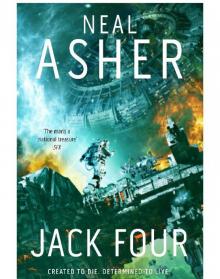 Jack Four
Jack Four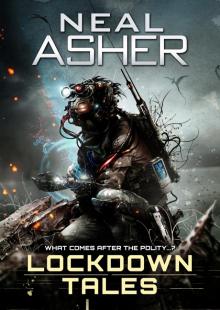 Lockdown Tales
Lockdown Tales The Warship
The Warship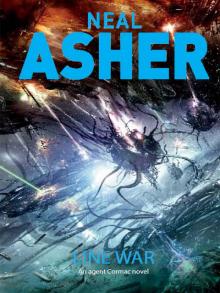 Line War
Line War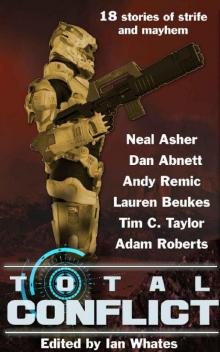 Total Conflict
Total Conflict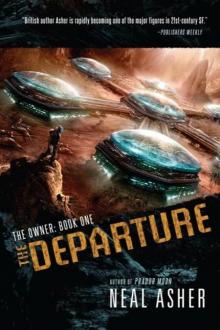 The Departure
The Departure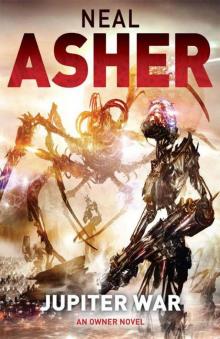 Owner 03 - Jupiter War
Owner 03 - Jupiter War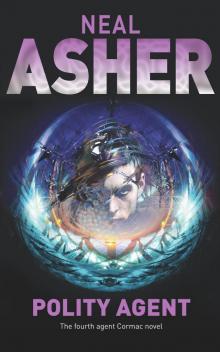 Polity Agent
Polity Agent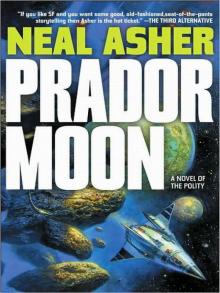 Prador Moon
Prador Moon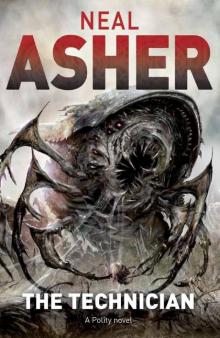 The Technician
The Technician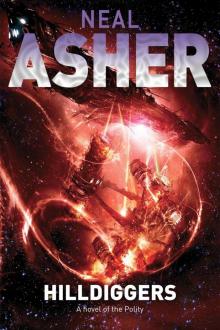 Hilldiggers
Hilldiggers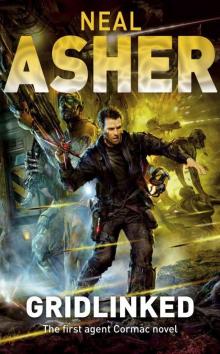 Gridlinked
Gridlinked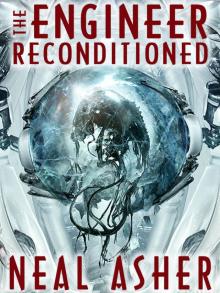 The Engineer ReConditioned
The Engineer ReConditioned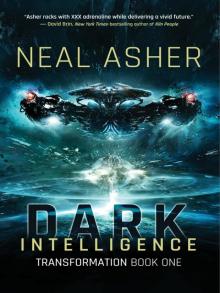 Dark Intelligence
Dark Intelligence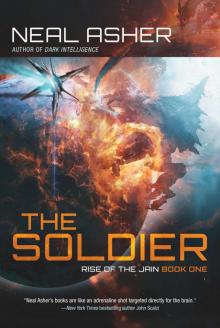 The Soldier: Rise of the Jain, Book One
The Soldier: Rise of the Jain, Book One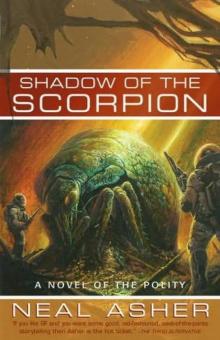 Shadow of the Scorpion p-2
Shadow of the Scorpion p-2 The Skinner
The Skinner The Soldier
The Soldier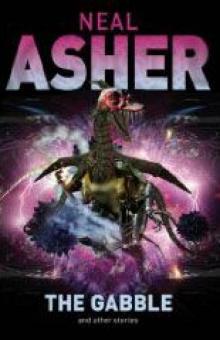 The Gabble p-13
The Gabble p-13 The Gabble and Other Stories
The Gabble and Other Stories The Parasite
The Parasite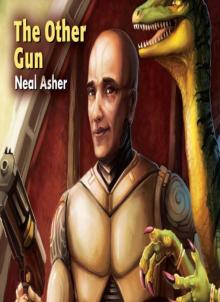 The Other Gun
The Other Gun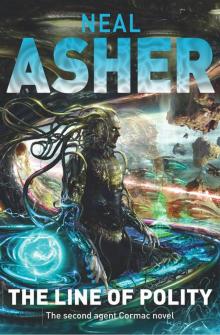 The Line of Polity
The Line of Polity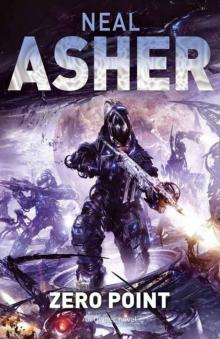 Zero Point (Owner Trilogy 2)
Zero Point (Owner Trilogy 2)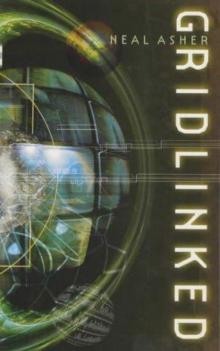 Gridlinked ac-1
Gridlinked ac-1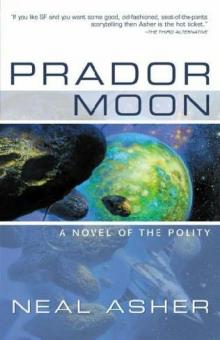 Prador Moon p-1
Prador Moon p-1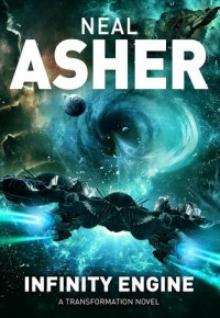 Infinity Engine
Infinity Engine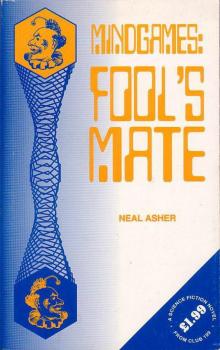 Mindgames: Fool's Mate
Mindgames: Fool's Mate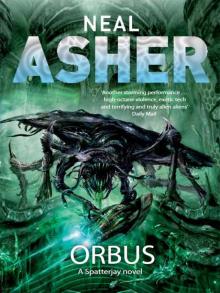 Orbus
Orbus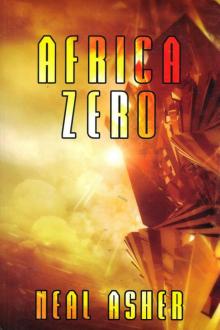 Africa Zero
Africa Zero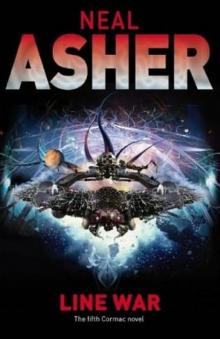 Line War ac-5
Line War ac-5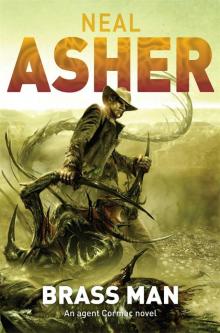 Brass Man
Brass Man The Departure to-1
The Departure to-1 Cowl
Cowl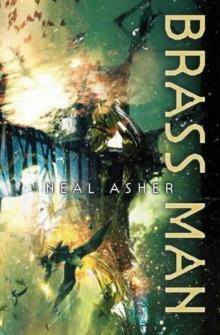 Brass Man ac-3
Brass Man ac-3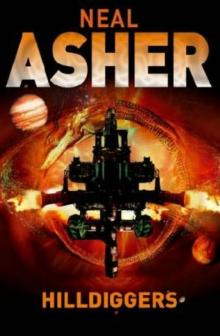 Hilldiggers (polity)
Hilldiggers (polity)![Greg Bear - [Eon Trilogy 1] - Eon (rescan) (v1.0) Read online](http://i1.bookreadfree.com/i2/04/08/greg_bear_-_eon_trilogy_1_-_eon_rescan_v1_0_preview.jpg) Greg Bear - [Eon Trilogy 1] - Eon (rescan) (v1.0)
Greg Bear - [Eon Trilogy 1] - Eon (rescan) (v1.0)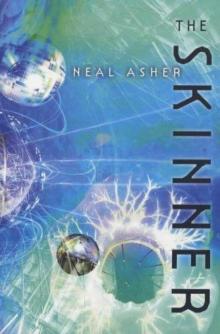 The Skinner s-1
The Skinner s-1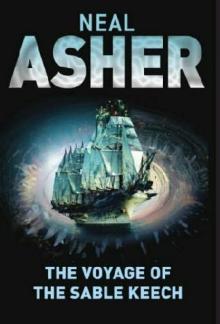 The Voyage of the Sable Keech s-2
The Voyage of the Sable Keech s-2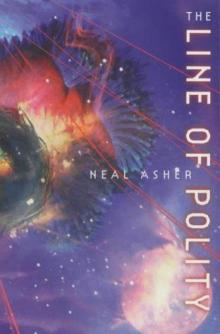 The Line of Polity ac-2
The Line of Polity ac-2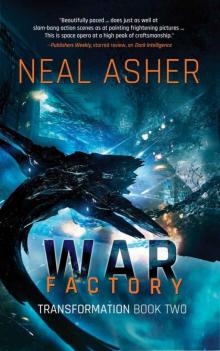 War Factory: Transformations Book Two
War Factory: Transformations Book Two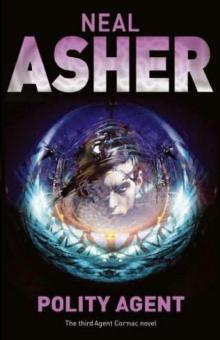 Polity Agent ac-4
Polity Agent ac-4